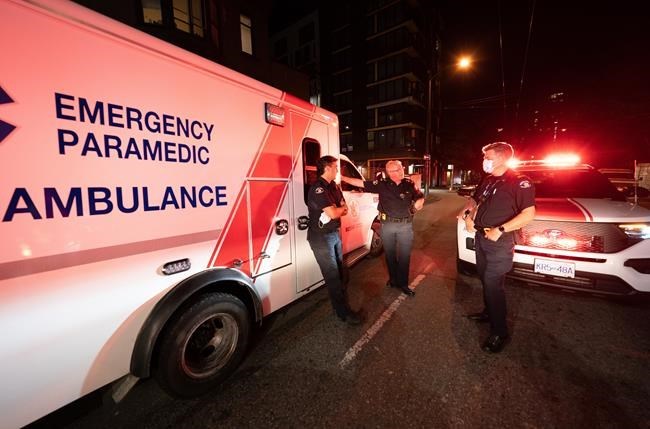
Paramedic Specialists Brian Twaites and David Hilder of B.C. Ambulance debrief after responding to a drug overdose in downtown Vancouver, Wednesday, June 23, 2021. Twaites says he has watched as the province's illicit drugs have become more toxic, requiring more effort and more overdose-reversal medication to save people's lives. THE CANADIAN PRESS/Jonathan Hayward
Republished April 14, 2023 - 3:19 PM
Original Publication Date April 14, 2023 - 11:36 AM
VANCOUVER - Brian Twaites remembers the first time he realized toxic drugs in British Columbia had hit a crisis level.
On one shift as a paramedic, he handled 26 calls and more than 22 of them were drug overdoses.
“Twenty-two of them were narcotic overdoses that we actually resuscitated,” he said.
“Another couple of those calls were, unfortunately, cardiac arrests and were more than likely related to drug poisonings but we were unable to resuscitate those people, and then there were a couple of other general medical calls that I did in that shift.
“I think that was a big realization of how hard it hit us.”
That was in either 2016 or 2017. It's difficult to remember for sure, he said, as the increasing number of calls have become a bit of a blur.
On April 14, 2016, B.C. became the first jurisdiction in Canada to declare a public health emergency over the increasing number of overdoses in the province.
At the time, officials said there had been 474 overdoses in 2015 and the numbers were climbing. The coroner later updated the toll to 529.
In 2022, toxic drugs claimed nearly 2,300 lives in B.C.
In a statement marking the declaration's seventh anniversary, Premier David Eby, Minister of Mental Health and Addictions Jennifer Whiteside and provincial health officer Dr. Bonnie Henry said they mourn with every B.C. resident who has lost a loved one, family member or friend to the crisis.
"Today, we deepen our resolve to save lives and improve lives, even as the COVID-19 pandemic's impacts have made the drug supply even more toxic for people in our province," the statement says, pointing to $1 billion in funding for detox, treatment and recovery services as well as youth supports.
Twaites worked as a paramedic for 36 years, mostly in the city's Downtown Eastside, before taking an administrative job with British Columbia Emergency Health Services this year.
He said as the drugs become more toxic, mixed with fentanyl and other substances, paramedics have had to work harder and use more of the overdose reversal drug naloxone to save lives.
"Now we're finding we're doing four or five times the normal dosing of naloxone," he said.
"We're also dealing with somebody who's deeply, deeply unconscious for 15, 20, 30 minutes at a time, having to ventilate these people for a much longer period of time and protecting their airway until we can reverse the overdose. So it's a big change."
Twaites said overdoses are happening across the province.
"It's not just (in) a back alley in downtown Vancouver or Victoria either. I mean, it's in every community in this province. You can see it in the nice end of town in Vancouver, you can see it in Smithers, you can see it in Prince George. It's everywhere."
He said drug users shouldn't use alone and should ensure their group is not using the same substance at the same time so someone can call for help in an emergency.
"So that to me is the key message for everybody. I can't tell you not to do this, but please do it safely," he said.
This report by The Canadian Press was first published April 14, 2023.
News from © The Canadian Press, 2023